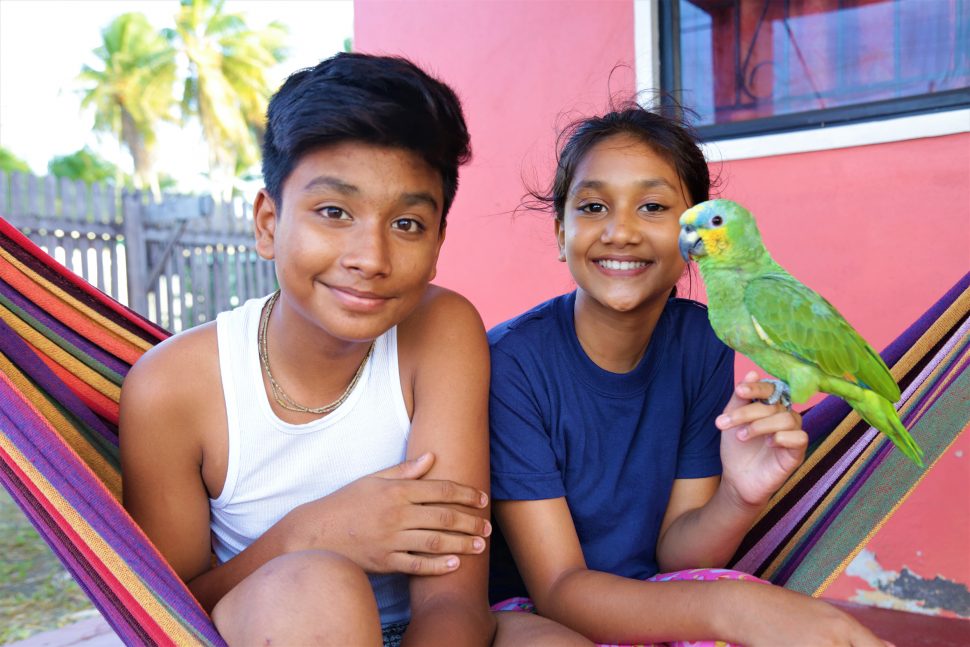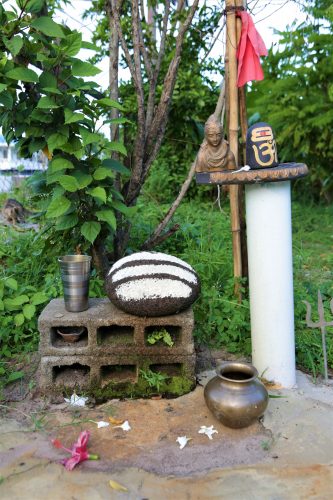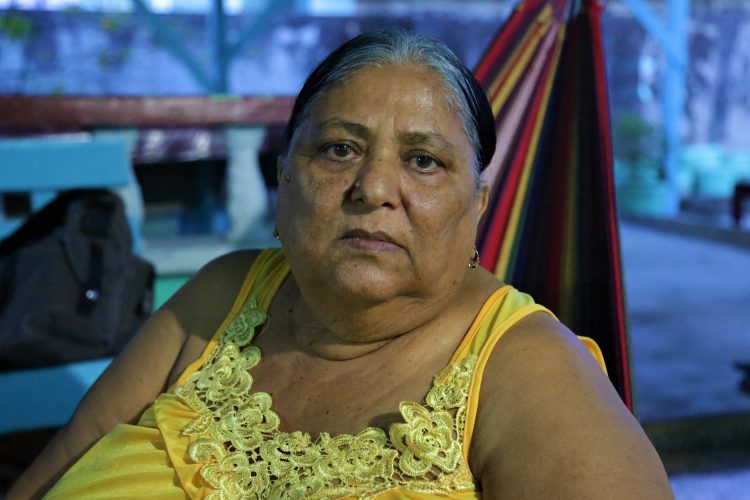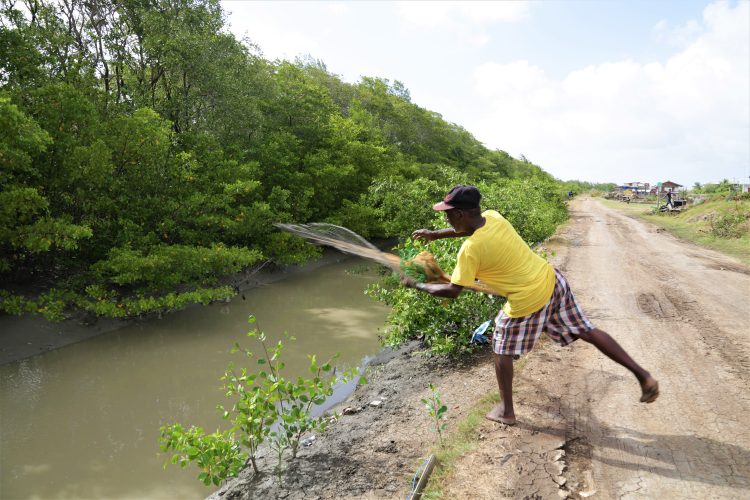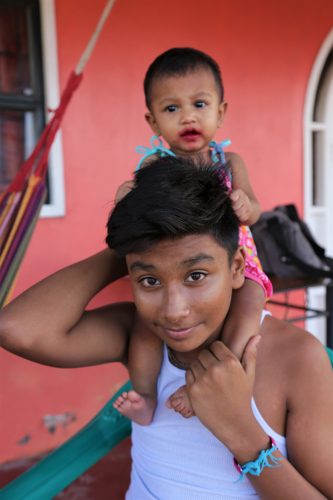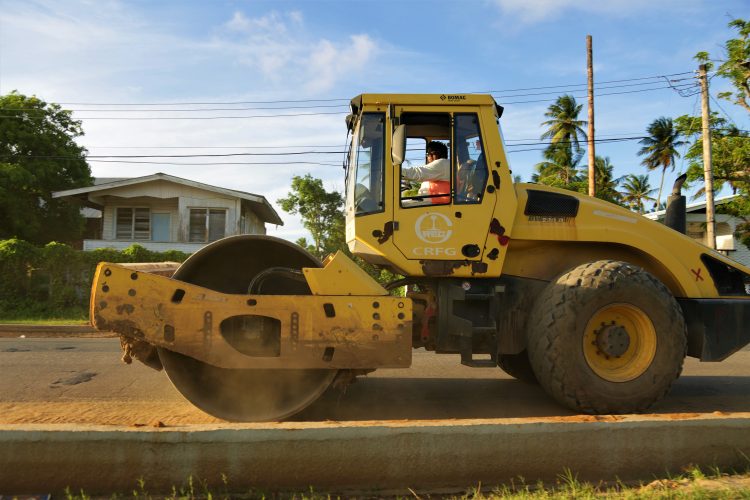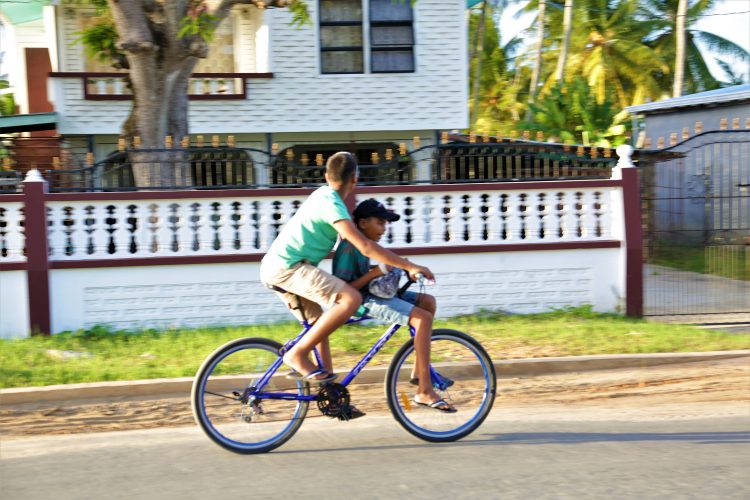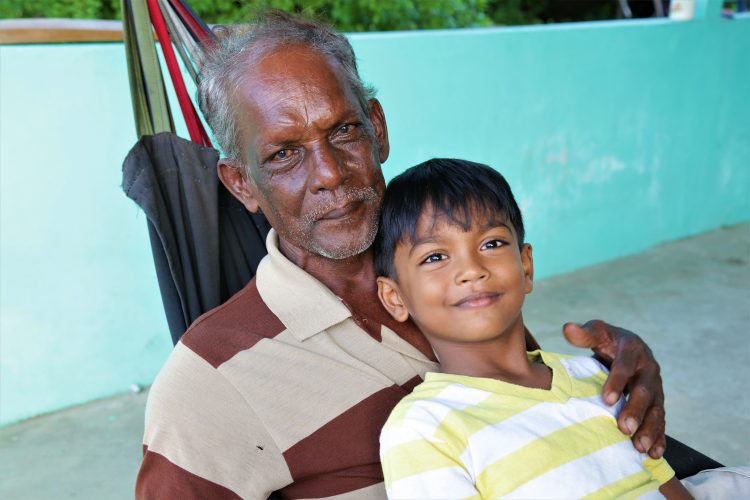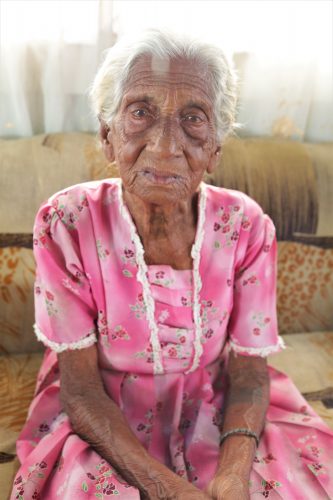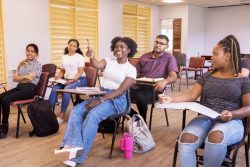The Coldingen residents who live along the East Coast Demerara public road are said to have lived there much longer than those at Sea Dam or in the housing scheme. Once there were more than 100 of them, but there has been a significant drop in the population living along the road. Today there’s an average of 40 residents.
Maybe for that reason there was scarcely anyone around, except for the handful of people at the gas station and mini mart and at the poultry business. Owned by the Arjunes, the business attracts customers from near and far. The Arjunes have made a name for themselves and their place is considered one of the best for quality chicken at wholesale prices. They supply various shops and supermarkets including the well-known Bounty Supermarket.
I found two young men working on a car in a yard. They laughed on learning my reason for visiting. “What you think about Agee,” one asked the other. “She is the oldest in the village. She gon turn 90 soon.” The grandmother referred to was 89-year-old Sumintra Mosai, who eagerly welcomed me.
“Me born and grow at Mon Repos but me marrid and come hey”, she told me. Her ‘R’s’ and ‘D’s’ rolled off her tongue akin to when a native of India speaks English. Her diction, however, was heavy Guyanese creole and she called me ‘pickney’. Her father, she said, was an indentured servant from India and so bits of Hindi were passed down to her and her siblings, which probably accounts for her manner of speech.
Mosai shared that she had three older sisters and one brother, who was the only one allowed to attend school. “India man nah send gyal pickney ah school. Deh seh when you learn gyal pickney fuh read dem guh write man and disgrace guh come pon yuh. Dat bin ah India people rule,” she said.
The girls were taught to cook and clean. She considered herself lucky because having older sisters meant she did not have much to do. When she was considered old enough, she was married off. Mosai could not remember how old she was when she got married, but she knew she was still a girl. She bore three sons, all of whom live nearby; her husband has since passed on.
Pointing to the tattoo on her hand, Mosai explained that it was called a Godna and that she was inked when she was married; it shows ownership and that she belongs to a husband.
After getting married, Mosai contributed to her home by selling the calaloo she grew at Bourda Market. Her late husband, the woman said was a fisherman and while she could have parceled greens to sell, she had a hard time doing that with fish since they were different species and came in different sizes. She said she told him upfront that she could not sell the fish.
The first thing Mosai does every morning is pray at her little altar in the yard. Her husband made it for her many years ago. Mosai said back when she used to visit the temple, she would see women gossiping during worship services. The men, she said, would have had a swig before or after going to the Mandir to pray. She was considered strong headed because she said what she had to say when she felt like saying it. It was for this reason, she said, that her husband built her the altar; he was worried that she might cause trouble.
Praying at her altar, the woman said, is what she looks forward to the most every day. She can still use a broom to sweep her house and pass the mop on the floor, but she doesn’t cook anymore. Cheerfully, she said she had to stop because she keeps forgetting whether she put salt in the food or not and on several occasions had over-salted her pot. Her daughters-in-law cook for her now. Mosai turns 90 in July.
Savitri Looknauth sat in the hammock under her house rocking her six-month-old great-granddaughter, Mia, whose red-stained mouth, she said, was from an icicle. “I come here when I was 15 years old. That’s when I got married. I’m from Corentyne Berbice,” she said.
The woman said her husband had gone to Berbice to attend her neighbour’s wedding and saw her walking up her steps. He later returned with his grandparents to ask for her hand in marriage. Looknauth said she was very shy and hid under the bed and her husband’s grandmother went to get her out promising to take care of her as long as she married her grandson.
Corentyne, she said, was a bright place and Coldingen seemed boring in comparison. For two weeks, she cried, until her husband took her back to visit her parents. Her mother, Looknauth said, sat her down and explained that when a girl gets married, she lives with her husband and can’t live with her parents anymore. The talk, the woman said, made it clearer for her to understand her duty as a wife.
“By 22, I dun had five children and the man had left and gone his way. Me baby was 21 days old when he left. Me ain’t take back nobody and me raised me children them. My grandmother-in-law and my grandfather-in-law, they help me out a lot. He grandmother keep her promise about taking care of me. They give me the place before they passed on,” Looknauth said. Part of the land is fenced off and rented to relatives operating the poultry business. The money helps to take care of the family. Her children are grown, but she now takes care of her grandchildren whose mother left when they were still toddlers. When her children were young, she planted cash crops and sold her produce wholesale at Bourda Market.
Looknauth said Coldingen has always been peaceful. She recalled when getting water was really hard and her sons would have to go to Vigilance, two villages away. Coldingen today has become home. Corentyne now, she said, is for visiting. She is comfortable where she lives. She gets her groceries from S&S Supermarket in Lusignan. There is also a supermarket in Strathspey, the neighbouring village. The road had streetlights until construction began to widen it. When it is completed, she said, the lights should be reinstalled.
“I born and grow in Coldingen,” Sirichand Dookna said. As a boy he attended Strathspey Primary and Golden Grove Secondary. Though he completed his secondary education, the man said, it was difficult getting a job and so he settled for working at the sugarcane estates, first at Enmore and later at La Borne Intention.
Dookna recalled taking a train into the backdam. The train was specially reserved for labourers working in the fields. In between crops he would catch fish, sometimes the sweet-water fish and at other times he would catch fish from the Atlantic standing at the seawalls. Today, sadly, the sluice at the head of the canal that runs between Strathspey and Coldingen is broken. Because of this saltwater gets into the canal.
“Although just a small area, Coldingen had a lot of families and each family had seven to eight children. The people were more open. Today they keep to themselves. Most of the people who used to live here migrated. Today the largest percentage of people live in the housing scheme,” he said.
Dookna has a kitchen garden and an altar in his yard, although he usually attends the Mandir in Strathspey.
Asked what he would like to see improved in his community the man spoke about a drain behind where he lives that hasn’t been cleaned in a long time. Because of that whenever it rains too much, the water backs up floods the back part of his land. A large part of the land behind him is therefore now a swamp. Another matter he would like to see addressed is the providing of residents with their land transports.
Aseeran Raffee sat in her hammock chatting with her nephew who sat on a nearby bench. She is plagued with arthritis and had her walking stick on a table nearby.
Raffee was born at Lusignan. She has been living in Coldingen some 31 years now. For a number of years, she visited Suriname where she bought masala, turmeric and cinnamon, which she ground herself and sold at Bourda, Stabroek and La Penitence markets. However, after she took ill, she was forced to stop. Raffee disclosed that she is also diabetic and has high cholesterol.
The woman showed me her bag of medication, adding that when she takes them, she becomes drowsy and needs to rest. However, she is often prevented from resting properly because of the noise from the church next door and a mechanical workshop across the road. She has spoken to the people in charge of both establishments but is yet to see a change. As it relates to the church, Raffee said she is just fine with them keeping their services, her issue is when the band starts playing.
Aside from this, life in Coldingen, she said, is lovely. Raffee is a Muslim and at the time of my visit Eid was about to be celebrated. Asked whether she would be celebrating the holiday, the woman said with a hint of sadness that she doubted she would be able to in her condition.
